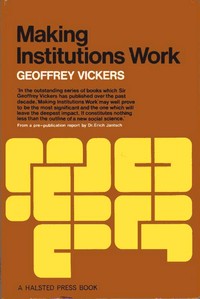Excerpt
In an increasingly interdependent world, each of us becomes inescapably a member of many systems, each of which makes its own demands on us, as well as giving its own assurances. These demands conflict. If we acknowledge them all, we have to resolve or contain a mounting load of internal conflict. It we deny any, we disrupt some relation on which we depend. Every human association makes some demand on its members for responsibility, loyalty, and mutual trust. We are unaccustomed to respond to, perhaps incapable of responding to so many and such conflicting demands as are generated by our increasing inter-dependence on each other. The memberships we acknowledge fall increasingly short of those we need to acknowledge, if we are to sustain all the relations on which we in fact depend. The conflicts of our day reflect our failure to meet the demands of our multiple memberships.
So we have either to increase our capacity for resolving or containing conflict or to simplify the world (or allow it to simplify itself) by cutting down what we expect of it, or each other, and of ourselves to the measure of our capacities. War, famine, and pestilence will do the second except in so far as we succeed in doing the first.
Editor’s Comments

“I have an unpopular answer to an unwelcome question,” Geoffrey Vickers writes at the start of Making Institutions Work:
The question is posed by two familiar but staggering changes of the last hundred years. One is the escalation of our expectations; the other is the escalation of our institutions. The two have combined to make demands on each of us ordinary men and women … which few have begun to notice, still less to accept as valid and inescapable. The question is how, if at all, these demands can be met and at what cost. Since these costs are the price we shall have to pay to maintain the systems which now sustain us or any viable alternative, I describe the theme as the price of membership.
I don’t suppose that I can manage to get too many readers excited about a thirty-six-year-old collection of sociological essays from academic journals with such dry names as Policy Sciences, Human Relations, and The Wharton Quarterly. Yet for me, Making Institutions Work has easily been one of the most stimulating books I’ve read a long time, one whose pages I’ve dog-eared, whose lines I’ve underlined, whose passages I’ve been tempted to grab people and force them to listen to. In many ways, it seems to me to be the closest thing I’ve found to a manual for how we need to operate if we have any hope of avoiding having all our conflicts settled by war, famine, pestilence, and climatic disaster.
 Sir Geoffrey Vickers led a remarkable life. He joined the British Army in 1914 and spent as much time as perhaps any other officer serving in the trenches on the Western Front, earning the Victoria Cross and numerous other combat medals for his bravery. After the war, he returned to university, took a law degree, and worked as a solicitor. He served again during World War Two and as an administrator and board member in government and industry. In his sixties, he turned to writing, particularly on the topic of social systems analysis, and became a leading contributor to the development of systems analysis and thinking, particularly as they related to human society. Making Institutions Work collects eleven articles and lectures Vickers gave in the late 1960s and early 1970s and focuses on the specific issue of how we can learn to deal effectively in a world where we are at all times members of multiple and overlapping institutions–family, culture, nation, organization, religion, teams, clubs, neighborhoods, and others.
Sir Geoffrey Vickers led a remarkable life. He joined the British Army in 1914 and spent as much time as perhaps any other officer serving in the trenches on the Western Front, earning the Victoria Cross and numerous other combat medals for his bravery. After the war, he returned to university, took a law degree, and worked as a solicitor. He served again during World War Two and as an administrator and board member in government and industry. In his sixties, he turned to writing, particularly on the topic of social systems analysis, and became a leading contributor to the development of systems analysis and thinking, particularly as they related to human society. Making Institutions Work collects eleven articles and lectures Vickers gave in the late 1960s and early 1970s and focuses on the specific issue of how we can learn to deal effectively in a world where we are at all times members of multiple and overlapping institutions–family, culture, nation, organization, religion, teams, clubs, neighborhoods, and others.
I work in an institution. From the day I stopped mowing lawns for money and went to work part-time in a university library, I have worked in one institution or another. And now I work in an instituion–NATO–where competing and conflicting demands of membership can be seen in every activity. The tensions between commitment to the objectives of this alliance and national loyalty are palpable in every meeting of every committee, working group, panel, board, and forum. In NATO, the fundamental mechanism of decision-making is consensus: if one nation does not agree to a decision, the decision is deferred or redefined or taken off the table.
In a consensus-driven institution, no single member ever wins all or loses all. Everything tends to favor not the most popular solution but the least objectionable one. As a result, all solutions that are supported by consensus tend to be sub-optimal. For anyone with the professionalism and pride to strive for well-crafted plans and efficient designs, the experience of working in NATO is one of constant frustration. Military officers, who comprise a good percentage of NATO’s staff at the headquarters level and below, find it particularly frustrating as they have spent their careers trying to boil things down to clear, simple, and quickly-executed orders: defining the shortest path between today and their mission’s objectives. In a consensus-driven institution, the shortest path is almost always guaranteed to lead nowhere but into a brick wall.
Vickers is the first writer I can recall to acknowledge that frustration is part of the price of competing membership demands. He identifies, in fact, “[T]he ability to tolerate greatly increased frustration without lapsing into apathy or escapism or erupting into polarised conflict,” as one of the essential survival skills for life in a world of overlapping and competing memberships. We long ago ran out of frontiers into which we could escape and, psychologically at least, pursue the myth of pure self-sufficience. But relative to the long run of human existence, this situation is still something of a novelty:
This institutions of today carry a far greater load than human institutions have ever carried before. Men are more dependent on them and make greater demands on them than ever before. Their performance is far more exposed to view and is judged by far higher standards than before. They are no longer supported in their task by being regarded as part of a natural order and for the same reason their critics are no longer muted.
Still, Vickers argues, institutions are here to stay: “[A]ny world which generations younger than mine may create or preserve on the other side of the dark decades ahead will include an institutional dimension and will make the same demands on us as players both of institutional and of personal roles.” Since these roles will inevitably create conflicts such as those I see every working day in NATO, there is an increasing need, in Vicker’s view, for what he calls (in a perhaps less than fortunate phrase) “institutionalised persons”:
By an institutionalised person I mean one who accepts the constraints and assurances of membership in all the systems of which he forms part and therefore with the responsibility for managing his share of the conflicts which they involve.
This begins to capture a distinguishing characteristic of many of the people and processes that I encounter working in NATO. Time and time again, when conflicts arise, the value that tends to win out most consistently is that of the importance of preserving the ability to work together again tomorrow. And in this way, this frustrating, multi-national, multi-lingual, bureaucratic, consensus-driven institution seems, like the U.N., the European Union, the U.S. Congress, and many of the other collaborative political institutions we frequently curse, to represent the most realistic approach to dealing with conflict in this hot, flat, and crowded world.
Ironically, the most memorable statement in the whole of Making Institutions Work is not Geoffrey Vickers’, but the epigraph, which comes from an even more obscure paper by Saul Gorn, a pioneer in computer science:
We spend the first year of our lives learning that we end at our skin; and the rest of our lives learning that we don’t.
In Vicker’s view, this task, more than anything else, is a matter of learning to pay our dues:
Those who depend so completely as each of us does on our membership of many human systems cannot afford to withhold the dues which they demand and need from us if they–and consequently we–are to survive and function. These dues are payable not merely in money–though the money dues also will have to rise–but in all the qualities which are needed to resolve or contain human conflict; in responsibility, loyalty and mutual trust; in intellectual effort and informed debate; in extended sympathy and tolerance; in brief, in a dramatic extension of the frontier which divides self from other and present from future.
And to that extent, one can find few better guides to this lifelong task than Geoffrey Vickers.
Find a Copy
- Find it at Amazon.com: Making Institutions Work
- Find it at Amazon.co.uk: Making Institutions Work
- Find it at AddAll.com: Making Institutions Work

I am delighted to see someone else recognize Geoffrey Vickers’ remarkable insights. I haven’t read Making Institutions Work, but I highly recommend his Freedom in a Rocking Boat, even though it’s scarcer than hens teeth. His was one of the best examples of a synthetic mind, right up there with Buckminster Fuller.